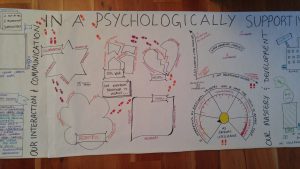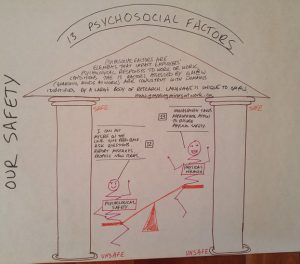I facilitate many large and small group discussions and always find that setting norms or…
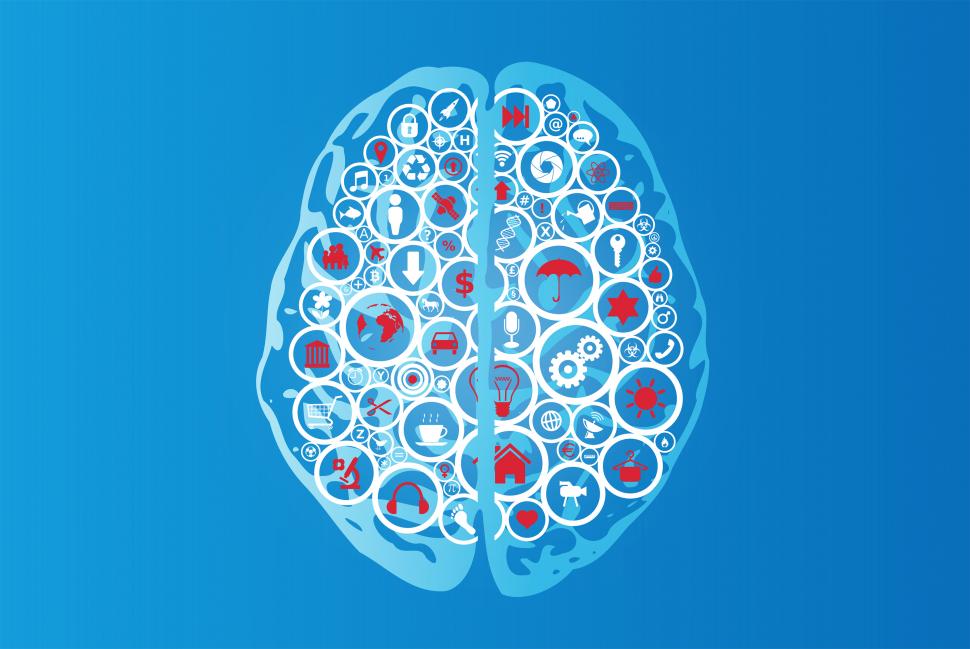
Starting the Conversation – A Psychologically Supportive Workplace
We need you to join the conversation. We have developed a visual survey about psychological health and safety in the workplace. It can help you jump start the conversation in your organization. We want to bring our 13 ft banner to your lobby or boardroom and get input from your employees so connect with us here.
Workplace Fairness West has been exploring the new Psychological Health and Safety Standards as championed by the Mental Health Commission of Canada. With the media full of talk about toxic workplaces we wanted to apply some appreciative inquiry techniques and shift the conversation to what could be.
We have used the input we received from others in the last few weeks and are taking our survey on the road with us as we present or speak at different conferences and organizations to gather more data.
The survey focused on 13 psychosocial factors as developed by Guarding Minds at Work and we would like to share it here. Our visual dot-survey questions were grouped into 5 areas to include all 13 factors:
A. Our Culture and Leadership:
- Psychological Support (1)
- Organizational Culture (2)
- Clear Leadership & Expectations (3)
B. Our Interaction and Communication
- Civility & Respect (4)
- Psychological Competencies & Requirements (5)
C. Our Mastery & Development
- Growth & Development (6)
- Recognition & Reward (7)
D. Our Welfare
- Involvement & Influence (8)
- Workload Management (9)
- Engagement (10)
- Balance (11)
E. Our Safety
- Psychological Protection (12)
- Protection of Physical Safety (13)
We took our survey into the lobby of the National Energy Board to mark Conflict Resolution Day on October 19th. Employees from many different organizations stopped by to join in the conversation. Here are some visuals of our survey before we began.
A. Our Culture and Leadership:
- My colleagues and manager are supportive of my psychological health
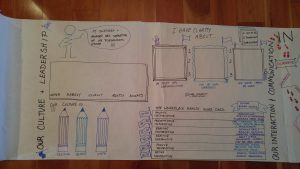
- Our Culture is: Trusting, Honest, Fair
- I have Clarity about:
- My Roles & Responsibilities
- How my Work Contributes
- How Change Impacts my Work
And information on the Workplace Fairness Institute’s Six Levels of Workplace Health to see where their organization fits by applying the Workplace Health Score Card.
B. Our Interaction and Communication
C. Our Mastery & Development:
- We are supported for learning & development
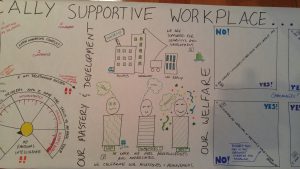
- At work we feel acknowledged and appreciated
- We celebrate our milestones and achievements.
D. Our Welfare:
-
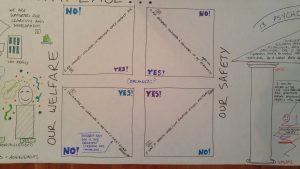 I am involved and included in decisions which impact me
I am involved and included in decisions which impact me - I can manage my workload in the time and with the resources I have
- I am engaged, connected and motivated in my working community
- I have a strong work-life balance and fitness, fun and family time.
E. Our Safety:
- I can put myself on the line, give feedback, ask question, report mistakes and propose new ideas
- Management takes appropriate action to ensure my physical safety
Developed by the Canadian Standards Association (CSA Group) and the Bureau de normalisation du Québec (BNQ), the Standard is a voluntary set of guidelines, tools and resources focused on promoting employees’ psychological health and preventing psychological harm due to workplace factors. How can we ensure that employees feel emotionally safe and comfortable in the workplace?
According to Guarding Minds @ Work (GM@W) Psychological health comprises our ability to think, feel and behave in a manner that enables us to perform effectively in our work environments, our personal lives, and in society at large. Psychological safety is different – it deals with the risk of injury to psychological well-being that an employee might experience. Improving the psychological safety of a work setting involves taking precautions to avert injury or danger to employee psychological health.
GM@W was developed by researchers from the Centre for Applied Research in Mental Health and Addiction (CARMHA) within the Faculty of Health Sciences at Simon Fraser University on the basis of extensive research, including data analysis of a national sample and reviews of national and international best practices, as well as existing and emerging Canadian case law and legislation.
The free resources at GM@W enables employers to effectively assess and address the 13 psychosocial factors known to have a powerful impact on organizational health, the health of individual employees, and the financial bottom line.

